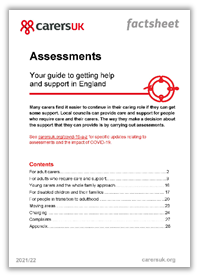What is a needs assessment?
A needs assessment could be the first step towards getting help and support with daily life. It’s provided free by your local council or trust, and looks at what help someone might need with their care and how they could get it. It can mean someone receives services or direct payments to help them.
A needs assessment isn’t a test that someone can pass or fail. It’s a chance to talk to a trained professional about getting support. The person being assessed can talk about any difficulties they have in looking after themselves, and how that affects them.
Getting support at home animation
Getting more help with your caring role can seem daunting, but some extra support can make a big difference. In this animation, we share some tips to help you request extra help at home.
Who can have a needs assessment?
Anyone who needs care and support can have a needs assessment. It doesn’t matter how simple or complex their needs are, or what their income or savings are. Anyone aged 18 and above, who appears to have a need for care or support can have a needs assessment, regardless of the level of those needs or the person’s financial resources.
Even if you as the carer are providing all the care the person needs, they are still entitled to an assessment.
Remember that carers can be eligible for a needs assessment too. If you think you could do with extra help and support, you can request a needs assessment for yourself too. You can have this as well as a carer’s assessment.
How do I get a needs assessment for the person I look after?
Anyone can request a needs assessment for another person. The Social Services department of the local council or trust has a legal duty to carry out a needs assessment once they become aware of the person’s potential needs.
The process will differ depending on where you live so download our country specific factsheets about assessments to find out more.
Contact the local council or trust of the person you look after. Tell them you help someone who needs care and support, and ask for a needs assessment for them.
If someone needs urgent support, the local council or trust can provide services before an assessment has been carried out. In this case, they will carry out a full assessment as soon as possible to make sure the right support has been put in place.
You can find contact details for your local council on GOV.UK. In Northern Ireland, you can find your trust at NI Direct.
More information on needs assessments
A trained care professional will talk to the person you care for about how they’re managing everyday tasks such as washing, dressing and cooking. The cared for person must be involved in the assessment and their needs and wishes should be taken into account. If someone has complex needs, the assessor should have specialist knowledge or expertise.
Needs assessments are normally done face-to-face, usually at the home of the cared for person. They can be done online, over the phone or by self-assessment, but only if the person you look after agrees to it.
The assessor should consider the following:
- the care and support needs of the person you look after
- the things that are important to them, such as a need to help with getting dressed or support to get to work
- their choices and goals, such as maintaining relationships or taking up a new activity
- the services, advice, information and resources that will stop or slow down any further needs developing
- their family’s needs.
You can be involved in the assessment if the person you care for would like this.
The person you look after will be eligible for help if they answer yes to all three of the following questions.
1. Do you need support because you have a physical or mental illness or disability?
2. Are you unable to achieve two or more care outcomes?
Care outcomes include someone’s ability to:
- prepare and eat food and get enough to drink
- maintain personal hygiene, eg by washing themselves and keeping their clothes clean
- manage their toilet needs
- dressing appropriately
- keep their home safe
- maintain and develop relationships with friends and family
- take part in any work, education, training or volunteering they wish to
- participate in social activities and hobbies
- use public transport and local services
- look after any children they’re responsible for
The assessor must only look at what the person can do for themselves and ignore any support you or others give them. The person must be assessed as unable to achieve an outcome if they can’t do it at all without help, or if doing it causes a lot of pain or anxiety, puts their safety at risk, or takes a lot longer than normal.
3. Could this have a significant impact on your wellbeing?
‘Wellbeing’ covers a lot of different areas, including being treated with dignity and respect, relationships with other people, health, safety and protection from abuse or neglect.
The local council or trust will give the person you care for a copy of their assessment notes. If they qualify for support, the council or trust must then draw up a care and support plan showing how these needs will be met.
If some of their eligible needs are already being met - eg by you as their carer - then the council or trust doesn’t have to meet these needs. However, they can’t just assume you’ll continue to provide the same level of care, so it’s important you’re clear about what you’re able and willing to provide.
If the person you care for doesn’t qualify for support, they must still be given information and advice on what can be done to meet their needs now and how to prevent their needs getting worse in future.
What help they get depends on their eligible needs. The council or trust can provide services or direct payments so the person you care for can arrange their own care and support.
Services might include:
- disability equipment or home adaptations
- help from a care worker with things such as washing, dressing or eating
- residential care
- access to day centres.
How much will the person I look after have to pay?
The local council or trust will carry out a financial assessment (or means test) for the person you care for. This will look at their income and capital and work out whether they need to contribute towards the cost of their care.
The council or trust can’t charge anyone else for their care, including you or anyone the cared for person lives with.
What if I’m not happy with the outcome or service?
If you, or the person you are looking after, are having issues with the local council/trust, the NHS or a care service, you or they could look into making a complaint to try and resolve these issues.
Other assessments
It may be helpful to know about other assessments that are available to help provide support.
If you’re under 18 and help to look after a relative with an illness or disability, then you’re a young carer. It’s important that you decide how much and what type of care you want to give, and whether you want to be a carer at all.
You shouldn’t be doing the same things as adult carers, or spending most of your time caring for someone else. Disabled adults are entitled to support from their local council or trust, so it’s important they have their own needs assessment to find out what help they can get.
If you're under 18, your carer’s assessment will be different to the one adult carers have. The assessor will look at the help you and your family need. The review will also explore whether it’s appropriate for you to be a carer, and whether you want to continue in your caring role.
The assessor must look at your education, training and leisure opportunities, and thoughts about the future. They should involve you, your parents and anyone else you want to include. You should get a written record of the assessment including whether the council thinks you need support and whether they’ll provide it.
If you’re 16 or over and not in full-time education, you may be eligible for help finding work and benefits.
If you’re a parent who cares for a disabled child, you’re entitled to a parent carer’s need assessment. It’s your chance to talk about the things that could make looking after your child easier. You may get services or direct payments to meet your assessed needs.
If your local council or trust thinks you may need support as a carer, then it must offer you an assessment. If it doesn’t, you can request one.
The assessment must take in account:
- whether you have needs for support, and what those needs are
- how much support you’re giving your child and whether you’re willing or able to give the same level of support in future. It’s important to be realistic about what you can do
- your wellbeing
- the need to safeguard the child being cared for, and any other children you have responsibility for.
This assessment can be combined with one for your disabled child, if you wish, and carried out by the same person.
If you care for a disabled child but you’re not their parent - for example, if you’re their grandparent - you don’t have the right to a parent carer’s need assessment. However, you can still request a carer’s assessment to find out what help you may be entitled to.
A carer’s assessment is specific for adult carers who are 18 or older and is separate from a needs assessment. It is an opportunity for you to put forward what additional support you might need to make your life easier as a carer.
This could be anything from help with taxi fares to hospital appointments, to temporary care cover put in place so that you can have a break every so often. For more information, see ‘What is a carer’s assessment?’
Latest updates

Carers UK response to the ADASS annual survey
This latest report reveals that most Directors of social services have seen an increase in unpaid carers approaching them for…

Government to set out timetable for Carer’s Leave review and commits to hold public consultation
Last night, as the Employment Rights Bill was debated at Report Stage in the House of Lords, Peers discussed an…

Carers UK reaction to third reading of the Universal Credit Bill
MPs debated the Universal Credit Bill in the house of Commons on 9th July 2025. The Bill in its existing…

The GP Patient Survey 2025: A widening health gap for unpaid carers
This year’s GP Patient Survey reflects a worrying trend for unpaid carers’ health. 72% of carers said that they have…
Got a question about caring?
Every day we hear from people who need help with looking after a friend or family member
Become a member for free
Joining Carers UK is free and takes just a few minutes.

